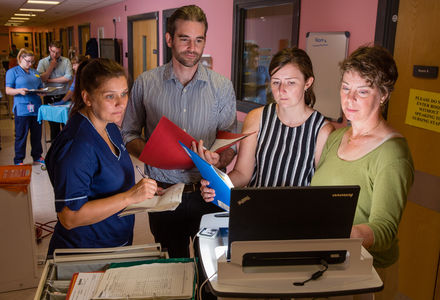Clinical Research Practitioners register represents game-changing accreditation for vital part of research workforce
Blog
- Beatson only UK site for pioneering prostate cancer trial
- Chief Scientist Office (CSO) - Supporting Patient and Public Involvement
- Clinical Research Practitioners register represents game-changing accreditation for vital part of research workforce
- ENRICH Scotland encourages the voices of care homes to speak louder in research
- First accredited Clinical Research Practitioner welcomed in Scotland
- Husband and wife support ENGAGE study
- Involving patients in cardiovascular research
- Much-needed funding provided to launch two Patient and Public Involvement (PPI) projects in Oral and Dental Health
- Organ and tissue transplantation research in Scotland
- Patient and public involvement in critical care
- Patient and public involvement in mental health
- Sustainable PPI in Co-designing Dundee Dental Hospital and Research School (DDH&RS)
- World Parkinson’s Day set to spark Scottish awareness of clinical research journey

CRPs are now formally identified as an occupational group in health and care in the UK by the UK Professional Standards Authority (PSA)
28th June 2022
New accreditation for Clinical Research Practitioners (CRPs) is set to significantly strengthen the skills base of the NHS Research Scotland (NRS) workforce, formally recognising the valuable contribution of previously un-registered health professionals and opening further study opportunities.
CRPs are now formally identified as an occupational group in health and care in the UK by the UK Professional Standards Authority (PSA), the body that sets the standards for accredited registers of people who work in health and social care.
Accredited registration for CRPs has been approved by the PSA as part of the Academy for Healthcare Science (AHCS) Accredited Register.
Accreditation recognises the contributions that CRPs make to health research in working side by side with research nurses across NRS.
“Hearing about this scheme is one of the most exciting things to have happened in my career to date.
“I have worked in clinical research for 14 years since graduating in Psychology in 2008, and have thoroughly enjoyed my experience, particularly as part of NHS Research Scotland’s Neuroprogressive and Dementia Network (NRS NDN).
“However, having recently completed my MSc in Health Psychology, senior positions within clinical research can be difficult to progress towards without having a registered position.
“I therefore welcome the register for CRPs as I feel strongly that a diverse workforce of individuals from a variety of backgrounds is crucial in delivering the complex clinical trials that we see in research today. I am proud of my role within NRS NDN and welcome the opportunity to have my profession recognised formally, in the form of CRP registration.”
Tiffany Stewart, Clinical Studies Officer, NRS Neuroprogressive and Dementia Network
CRPs are a vital part of the research workforce – which continues to transform treatment in the NHS and the care we receive – and their numbers have increased in response to the expansion of research activity over the last few years.
CRPs are a diverse group, working in direct contact with patients, or other study participants and typically bringing a wealth of research knowledge and expertise to research delivery teams, in turn delivering safe, ethical, and high-quality clinical research care.
While CRPs – whose roles can include Clinical Studies Officer, Research Practitioner, Clinical Trials Practitioner, and Clinical Trials Officer, among others – are already considered an important asset, accreditation will help to develop the professional identity of this group, recognise their expertise, and enable effective professional development, a strategic priority for growth of the research workforce.
“The emergence of the Clinical Research Practitioner role and the formation of the CRP Registry is an exciting development. As we seek to expand and diversify our future clinical research workforce in Scotland, it is important that we attract and retain staff to compliment the predominantly research nurse and AHP led clinical research delivery of trials.
“Developing clear job and role profiles, mentorship programmes and career development opportunities for this group of emerging staff will be a critical piece of work for NRS to lead on in the coming months and years. We are committed to ensuring that patients and the public are offered clinical research opportunities. That will require the right skill mix of staff to support the NHS and wider research community as activity in this area increases.
It is only right that the skills and the subsequent registration of CRPs will place them on an equal footing as other recognised professionals including offering assurance and accountability to participants, teams, and employers; raising the profile of the CRP role and professional practice; and helping shape clearer career pathways for their profession.”
Stephen McSwiggan, Deputy Director of Edinburgh Clinical Research Facility, NHS Lothian
Find out more
- Read more about Clinical Research Practitioners
- Apply to join the CRP Directory


